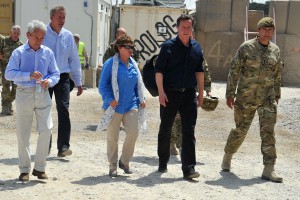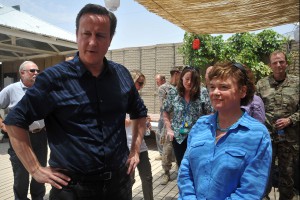23rd July 2012 Harare, Zimbabwe
Prime Minister David Cameron’s visit to Helmand
Prime Minister David Cameron visited the Helmand PRT on Wednesday 18th July. This was his ninth visit to Afghanistan, having failed to get to Helmand on the last two occasions – the first time because a soldier sadly went missing and air assets were prioritised to search, second because of the infamous Helmand sandstorms.
So we were delighted that he made Helmand his first port of call. Not wanting to disrupt the daily flying programme, the PM and his party shared flights with soldiers and civilians on their normal daily business. This was much appreciated by our air asset coordinators whose main challenge is juggling VIPs who regularly descend on Helmand, and I guess it was fun for the other passengers too – it’s not every day you bump into the Prime Minister on your Helmand commute!

After many visits he clearly takes these conflict zone visits in his stride. My first impression was how personable and charming he was, despite the gruelling journey and oppressive 47 degree heat. As we strolled from the helipad he asked me how long I was planning to stay – and seemed pleased to hear that I will do a full 18 months to see through the main period of transition.
Brig Doug and myself then briefed on our respective areas. The PM wanted to focus on transition – asking how ready the Afghans are, both on the civilian and military side, for our withdrawal by end of 2014.
On the civilian side I emphasised that Helmand is a success, but that success is not yet guaranteed. At this point in transition the Afghans are clearly in the lead. Success so far has been down to four factors: (i) security which has enabled freedom of movement and enabled the people to connect with their government; (ii) leadership from Governor Mangal; (iii) the unique governance model in Helmand with elected District Councils now in 7 Districts; and (iv) delivery of basic services and justice. The challenges now are to lock in these gains in the Central Helmand River Valley (where the majority of the population live), and secondly to set the conditions for Government to extend its reach into areas in the north and upper Gereshk Valley where Taliban, war lords and poppy dealers compete for power.
Government still has a job to do to earn respect and support in these contested areas. We know from more stable areas that government needs to be accountable to be seen to be legitimate. I finished by saying our focus going forward would be on supporting the local peace process and boosting the legitimacy of government.

The Prime Minister was interested in the elected councils, rule of law, and whether the Taliban are still offering an alternative to the legitimate government. He posed the same question to Governor Mangal’s security adviser, Shamsi, in a later meeting with key Afghan partners. Shamsi’s view was that the people had only turned to the Taliban for justice because it was swift and because the government was not delivering. That was not the case anymore, disputes were being brought to GIRoA’s formal system. The discussion was rich, and PM was clearly well briefed.
After meeting the Provincial Chief of Police Col Elham (who is acting Governor in Mangal’s absence), and Shamsi, he had a cup of tea with troops and then met PRT staff. I introduced him to a range of staff from a Danish policeman, a US political officer, and Afghan members of staff who work in corporate services and economic development, to showcase the international diversity of the PRT. The PM then addressed PRT staff, thanking us for the great work being done, and the progress made. He confirmed that Britain and our partners will support Afghanistan for the long-term, as demonstrated at the recent Chicago and Tokyo conferences. We appreciated that he referred to the recent loss of an Afghan member of our staff who was caught up in an incident whilst off duty.
These visits take a huge amount of planning and I am lucky to have had such an excellent team who worked incredibly hard for many weeks to make it look effortless on the day. A huge thank-you to Lizzie Lovett , Claire Nichols and Ali Algate in particular. The visit was an important one for us at the critical stage in the mission. It was really encouraging to see how engaged the PM remains in Afghanistan and the clear message he sent that Britain will stand by Afghanistan for the long-term and that the work we are doing now with our Afghan and military colleagues is appreciated back in No 10.
Hi Mr Cameron. It is very obvious that we are not achieving any success in Afgan. We have now been there longer than the second world war, with 400 of our solders killed.
What were our original objectives, does any one know. You do not have to follow Mr Blairs original mistake. Why are we leaving so much equipment behind , when we leave. This will go straight to the Taliban.